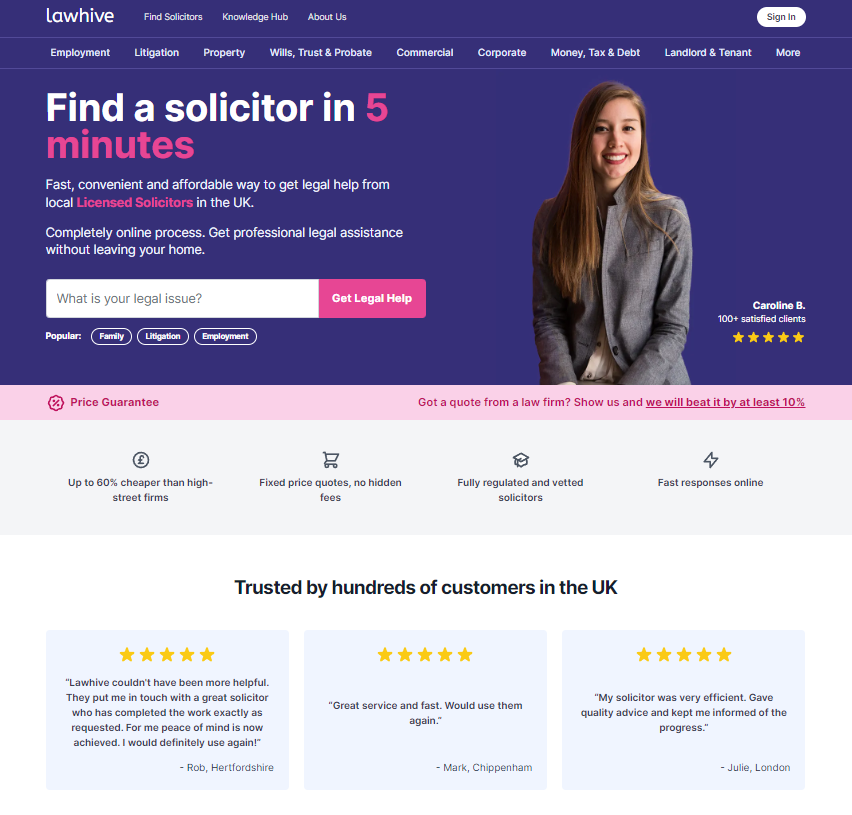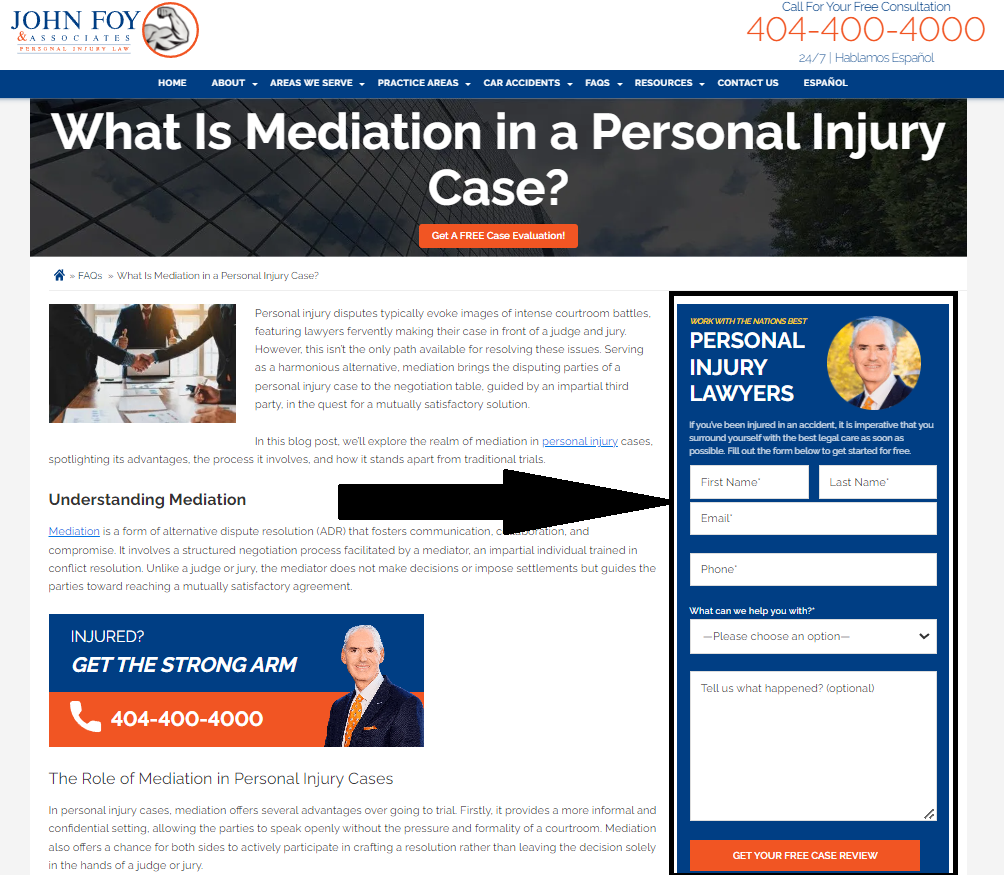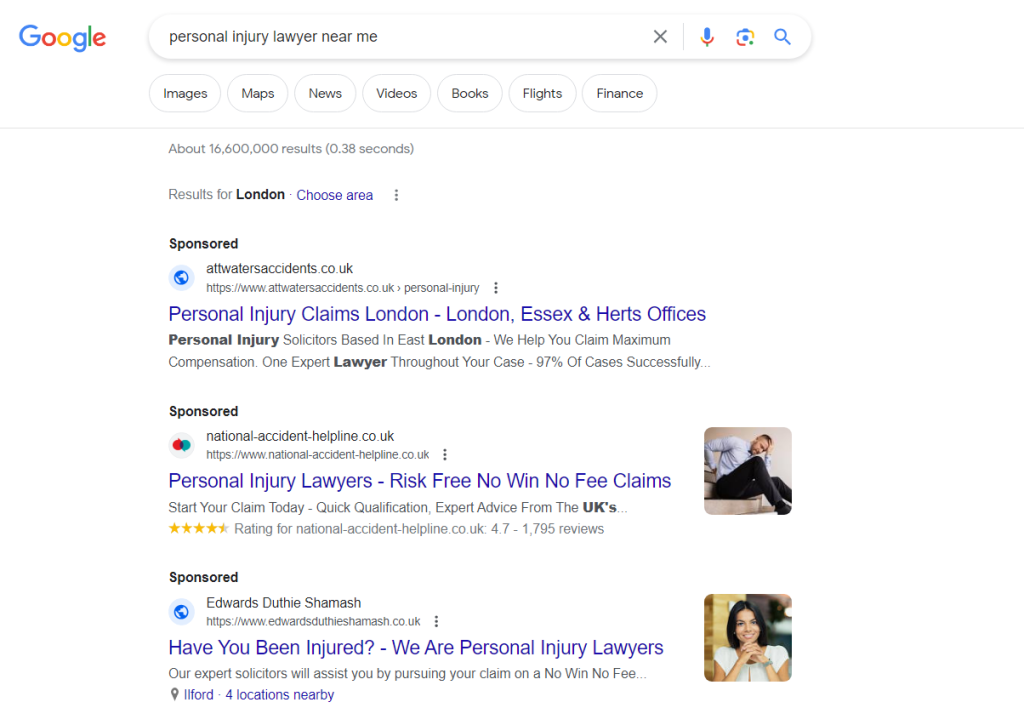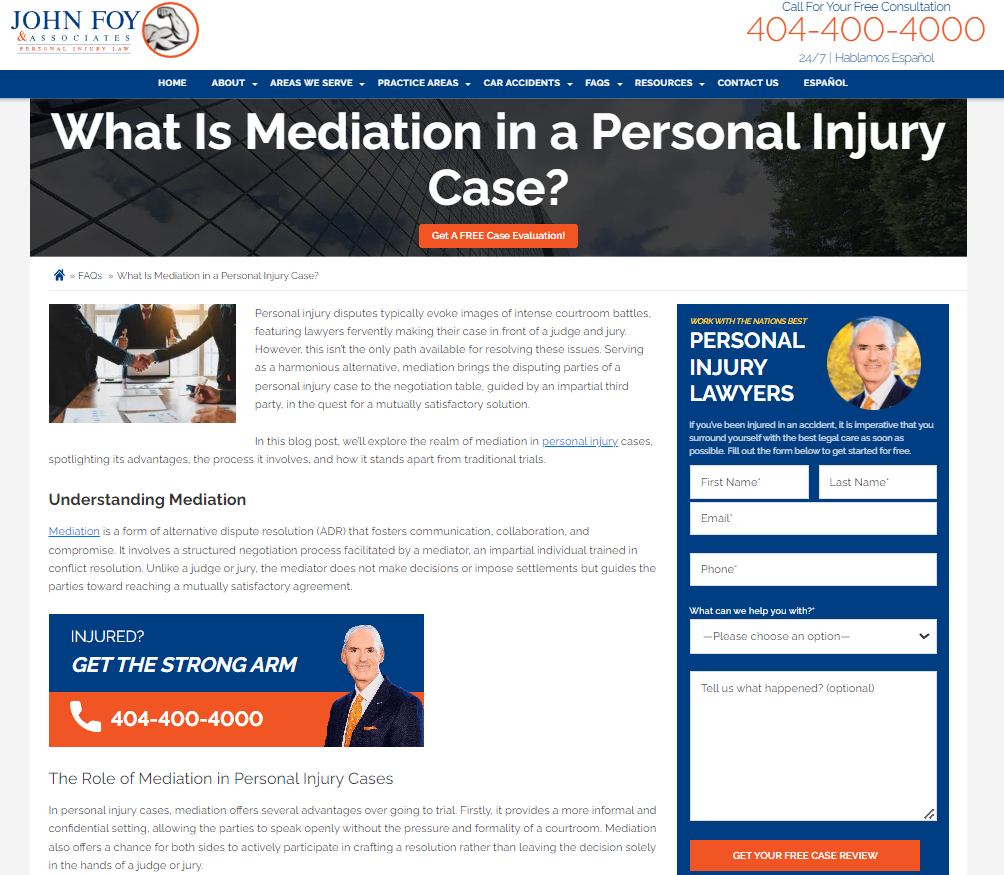Are you a law firm grappling with the common challenges of acquiring legal leads? Many businesses encounter situations such as:
- Elusive growth despite a consistent flow of leads.
- A once-effective marketing approach that is no longer yielding the anticipated results.
- Uncertainty surrounding a marketing agency’s operations, with leads failing to materialise.
- Increasing concern about losing leads to competitors.
This post aims to provide practical solutions to enhance your strategy and address these issues in the realm of legal leads and client acquisition.
Enhance The Website And Landing Pages Of Your Law Firm
To attract customers, your website should be operational around the clock. Digital marketing experts understand that a well-designed website and landing page are the cornerstone of successful lead generation in the legal industry. These digital assets not only create a professional online presence but also serve as vital tools for capturing and converting potential clients into valuable legal leads.
Take a look at your webpage. How effectively does it guide individuals toward becoming customers? If your website were a person, would it be a compelling advocate for attracting new clients?
If not, your legal practice may be missing out on significant lead-generating opportunities.
Your website should convey key information to potential legal clients within seconds:
- What you’re offering?
- Why should someone choose your services?
- How can they become a customer?
Conversion rate optimization, or CRO, is a crucial factor to consider. It’s all about ensuring that your website easily converts visitors into clients.
Also Read: Mastering the 7 Essential Attributes of a Good Landing Page
Conversion Rate Optimisation For Law Firms
Improving your website’s conversion rate is all about simplifying the process for potential clients to become leads. Essentially, you’re optimising your website to encourage conversions.
Now, let’s take a look at the Lawhive homepage.

The website effectively communicates its purpose—it helps users find a solicitor in less than 5 minutes. It highlights the service’s key features: speed, convenience, and affordability. The site leaves no room for confusion, making it evident that this is an online procedure.
Take, for instance, the search box CTA. Instead of a generic “Search,” it prompts users with “What is your legal issue?” providing clear guidance on what to search for. Just below the search box, there are several suggestions to assist visitors in getting started.
Lawhive goes beyond these initial efforts. A benefits bar is prominently displayed in case consumers are hesitant to take the next step. Users are reassured that there are no downsides to using the search tool—it comes with a price guarantee, set quotations, authorised solicitors, and a promise of a quick response. Any inquiries or concerns that visitors may have are addressed above the fold (the visible portion of the page that doesn’t require scrolling).
For those who already know the type of lawyer they need, the top menu provides a quick navigation option, allowing them to bypass the search field.
Use SEO To Reach Out To Legal Clients
Improving your law firm’s online presence through SEO is crucial for connecting with potential clients actively seeking legal services.
Consider this scenario: prospective clients are browsing search engines, posing queries like “solicitor near me” or exploring their options with questions like “Am I eligible for a personal injury payout?” These are the moments when your company needs to be front and centre.
Start by understanding the specific searches consumers conduct just before becoming leads to enhance your SEO for conversions. Tools like Semrush can provide insights into the keywords and phrases that your site—and your competitors’ sites—are currently ranking for.
Reflect on past client conversations or consult with colleagues to delve deeper into the questions potential clients frequently ask. Tools like AlsoAsked and Answer the Public can help uncover additional questions.
While law firm SEO may seem technical, it fundamentally revolves around prioritising people. For instance, by entering “personal injury law” into AlsoAsked, we identified significant questions that could be addressed in blog entries on your site, such as:
- Should I hire a lawyer to represent me in a personal injury claim?
- How long does it take to resolve a personal injury claim?
- What is the typical settlement for personal injury claims?

Aligning your website with these sought-after queries ensures it will appear prominently in search results. Consider optimising the following crucial pages:
- Your homepage should focus on your primary term, such as “Lawyer Utah” or “Solicitor South London.”
- Legal services pages can specialise in phrases like “Family law Utah” or “Conveyancing services South London.”
- Your law firm’s blog serves as a hub for addressing inquiries, a vital component of your content marketing plan, which we’ll discuss momentarily.
While SEO takes time to gain traction, the long-term benefits are well worth the effort. Building a solid foundation today increases your chances of converting high-quality search engine leads.
Also Read: 11 AnswerThePublic Alternatives Compared
Content Marketing For Law Firms
When we discuss content marketing, we’re talking about all the content that represents your brand. This encompasses not just the material on your website, like page descriptions and blog posts, but also content that exists beyond the confines of your website.
Your website acts as a central hub for various types of content that convey your brand’s message, beliefs, and products. This includes the descriptive text on your pages, the insights shared in your blogs, and the story told on your about page. These elements collaborate to shape your online presence and captivate your audience.
However, content marketing doesn’t conclude with your website. It encompasses any content associated with your brand, such as posts, videos, or other items published on third-party platforms. This broader perspective recognizes that your brand’s influence and message may extend well beyond your website, and the effectiveness of your content strategy is not confined to a specific online location.
Lead Generation Through Blogging
Let’s delve deeper into how attorneys can leverage blogging for lead generation.
To start, it’s crucial to recognize that blogging extends beyond merely boosting general website traffic; it serves as a potent tool for generating leads. Unfortunately, many legal firms overlook this potential, treating blogs solely as a source of traffic.
While nurturing cold traffic is undoubtedly important—guiding them toward becoming clients—there’s another dimension to consider. Blogs can also be employed to attract prospective clients who are on the brink of becoming actual clients.
In the realm of search engine optimization (SEO), your research should reveal the common queries consumers pose just before making a decision. These questions offer valuable insights for content creation.
The objective now is to strategically utilise your blogs to address and answer these crucial concerns. Some inquiries may require more in-depth responses than others, but irrespective of the length of your blog posts, always include a clear and compelling call to action.
In essence, blogging for attorneys entails skillfully guiding potential clients through their decision-making process and, ultimately, motivating them to take that pivotal step toward becoming clients.
Also Read: Local SEO for Lawyers in 2023 – What You Need to Know
Creating Calls To Action In Order To Create Leads
When it comes to your call to action (CTA), it’s crucial to personalize it according to the stage of your reader’s client journey. If the question you’re addressing is a tipping point for someone becoming a customer, seize the moment, and encourage them to take the next step by scheduling a session.

On the other hand, if your content is geared towards individuals in the early stages of their journey, shift your focus to converting them into email subscribers. Craft a CTA that aligns with their needs, such as an enticing email list sign-up or a valuable downloadable guide.
Additionally, remember to adapt the tone of your CTA to match the distinct atmosphere of your blog content. Recognize that the emotional context around someone seeking a divorce lawyer might be drastically different from that of someone looking for conveyancing assistance. By acknowledging and adjusting to these nuances, you can make your approach more personalised and resonate better with your audience.
Using PPC To Increase Your Law Firm’s Lead Generation
PPC, or pay-per-click advertising, refers to the advertisements visible during internet browsing—whether on various websites, social media platforms, or search engines.
In the realm of lead generation for attorneys, PPC is emerging as a crucial technique. The objective is to engage with potential clients in digital spaces where they frequently spend time or actively seek legal services. Mere presence is insufficient; strategic placement is essential to ensure that you are positioned where your target audience is most likely to interact with your offerings.
Search Ads
Search advertisements prove to be a highly effective strategy for generating leads, especially in fields like personal injury litigation. Individuals actively seeking legal guidance in this area represent potential clients eager to tap into your expertise; they merely need to connect with the right legal representation.
Identify specific search phrases consistently yielding high-quality leads through your SEO analysis. Input these phrases into major search engines like Google or Bing and carefully analyse the results. Pay attention to their offerings and unique selling points (USPs).

It’s crucial to comprehend the current advertising landscape as you’ll be contending with these advertisements. In the image above, all ads related to the search term “personal injury lawyer near me” are relevant, some emphasising specific regions. Notably, each ad provides information on services offered and any exclusive deals.
When crafting a search ad for personal injury law, include the following:
- A compelling headline that not only captures attention but also incorporates targeted keywords. Drawing inspiration from the impactful blog headlines we discussed earlier can be beneficial.
- Text delivering a persuasive proposal, clearly outlining what sets your legal services apart, and compelling readers to choose you for their personal injury case.
- Ad extensions, such as links to additional relevant pages on your website or a click-to-call button, to facilitate quick and easy contact for potential clients.
Remarketing
When consumers seek legal assistance, they’re not typically scrolling through social media in the hopes of stumbling upon a law firm ad. However, social media advertisements can still generate leads for your company. The key is to embrace remarketing.
Remarketing, also known as retargeting, involves reconnecting with former visitors to your website as they navigate the internet. By creating ads that target those who have visited specific pages on your law firm’s website, you can offer them a more personalised experience.

Take, for instance, the Slater and Gordon advertisement above. Its captivating imagery and thought-provoking query, such as “injured on vacation?” make it a successful remarketing ad for individuals interested in accidents overseas. The wording of the advertisement emphasizes Slater and Gordon’s legal expertise, providing clarity on its purpose.
However, the advertisement isn’t flawless. The Trustpilot evaluations are lacking, and the product is somewhat ambiguous. Viewers may be uncertain about potential charges or future steps. Enhancing these aspects could significantly improve the ad’s overall effectiveness.
Law Firm PPC Best Practices
- Enhance Visual Appeal: Incorporate visually captivating elements into your advertisements, especially if graphics play a role in your advertising strategy. This could involve utilising high-quality photographs or graphics that not only grab attention but also effectively convey your message.
- Craft Compelling Text: Develop persuasive and intriguing ad text that compels viewers to take action. Clearly articulate the value or benefits of your legal services, giving viewers a reason to click on the ad.
- Create an Eye-Catching Title: Your title should be concise and attention-grabbing. Since it’s the first thing readers see, ensure it sparks their interest and motivates them to read more or click for additional information.
- Tailor Ads for Diverse Audiences: Customize your advertisements to resonate with various target audiences and unique search queries. Understand the diverse needs and interests of your potential clients, and tailor your messaging to maximise relevance.
- Conduct A/B Tests: Experiment with multiple variants of your advertising to identify what resonates most with your target audience. Test new images, headlines, or language to enhance the effectiveness of your ads.
- Monitor Analytics: Keep a close eye on key indicators such as click-through rate (CTR), conversion rate, engagement, and return on ad expenditure (ROI). Analytics provide valuable insights that can guide informed decisions about the effectiveness of your PPC campaign.
- Adjust Ad Creative Based on Performance: Be proactive in making changes if you notice a decline in performance. This may involve tweaking your ad creative, encompassing both language and imagery, to address concerns and improve overall effectiveness.
Generating Legal Lead Magnets
Lead magnets, which encompass resources like checklists, calculators, and guides provided to prospective clients in exchange for their email addresses, prove instrumental in boosting lead generation for law firms.
These strategies not only enhance engagement but also foster relationship building. When integrating lead magnets into blog content, it’s crucial to ensure their relevance to the material. This ensures that readers can actively engage with the content and derive value from it. This approach not only sparks the interest of potential clients but also establishes a valuable email list for sustained communication and ongoing relationship development.
Providing Free Legal Consultations And Guidance
Law firms can effectively generate leads by offering prospective customers a complimentary consultation or guidance.
Many individuals seeking legal assistance are uncertain about the specific services they require or whether a law firm can cater to their needs. If they are hesitant to pay for an hour of legal advice, they may be unsure about the merit of their case and reluctant to commit.
Providing a free consultation or guidance eliminates any perceived risk for prospective customers. This strategy not only builds trust with those seeking legal aid but also enhances lead generation.
Concerned about filtering out unqualified leads? Ensure that those you consult with genuinely require your services by implementing a sign-up form. This form can help identify individuals with the same areas of expertise as your legal business.
How Using A Marketing Agency Can Help You Get More Leads
Experience And Knowledge
The most successful digital marketing organisations boast considerable expertise across various sectors and are backed by a team of skilled professionals. Each expert delves deep into their respective field, ensuring a robust understanding of their craft.
Attempting to handle the responsibilities of 9-10 specialists with a single in-house marketer or a small team is an insurmountable challenge. The rapid evolution of each marketing channel makes it challenging for any individual to stay truly current in these domains, let alone encompass the entire breadth of the 10-plus marketing sectors crucial to businesses.
Cost
Engaging a marketing firm may seem like a substantial investment initially, but consider a few crucial factors.
When opting for an in-house team, one must factor in costs such as pensions, salaries, and benefits, which can surpass the expenses associated with utilising an agency.
If your management decides on a recruitment agency, be prepared for a hefty recruitment fee. Additionally, the hiring process might be prolonged and intricate.
Training expenses could also escalate, especially if the new employee lacks prior expertise.
If your law firm’s lead generation strategy has hit a roadblock, it’s worthwhile to consult with an agency to explore ways to enhance it.
Lead Generation For Lawyers
Enhancing your leads and acquiring new clients is crucial for any legal firm, and achieving this goal is not as challenging as it may seem.
It simply requires some strategic marketing and a bit of patience, but the outcomes can be highly rewarding.
Key areas to concentrate on are:
- Enhancing the conversion rate optimization of your website.
- Directing your SEO efforts toward effective lead generation.
- Developing content that resonates with your ideal clientele.
- Utilising PPC campaigns to reconnect with potential leads.
- Crafting compelling lead magnets.
By adhering to these steps, you will be on the right path to attracting more high-quality legal leads.
Conclusion
To summarise, boosting legal leads involves a dynamic process that requires a strategic blend of digital marketing, content creation, and client engagement. By implementing the aforementioned strategies, legal professionals can enhance their online presence, establish a strong reputation, and ultimately secure a consistent flow of qualified leads.
It’s crucial to stay abreast of industry trends, continually refine marketing approaches, and prioritise client relationships. In the evolving legal landscape, firms that proactively adapt their lead generation strategies will not only generate more legal leads but also cultivate a robust and sustainable practice in a competitive legal marketplace.
FAQs
Why is lead generation important for lawyers?
Lead generation is crucial for legal practitioners because it helps identify potential clients interested in legal services. More leads translate to increased opportunities to convert prospects into customers.
What role does networking within the legal community play in lead generation?
Networking within the legal community contributes to establishing contacts with other professionals who may refer clients. Attending legal events and joining professional organisations can also enhance exposure and reputation.
Are there any pitfalls to avoid while generating legal leads?
Certainly, common pitfalls include neglecting to maintain a robust web presence, underutilizing social media, and overlooking the significance of client testimonials. It is vital to stay informed about industry trends and adjust strategies accordingly.
Which metrics should lawyers consider to determine the effectiveness of their lead-generation efforts?
To evaluate the efficiency of their lead generation strategy, legal professionals should monitor metrics such as website traffic, conversion rates, social media engagement, and the return on investment (ROI) of advertising campaigns.



























